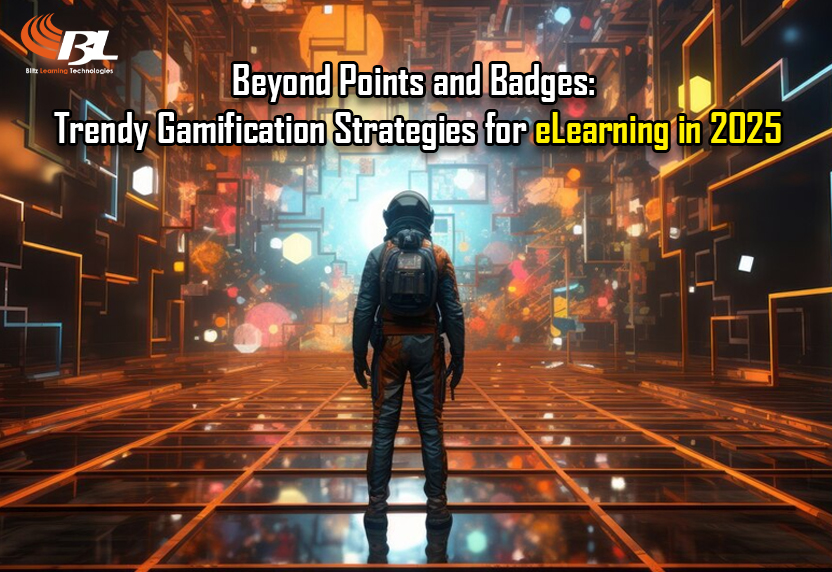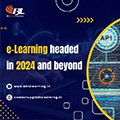
Blog
- Home
- Blog

05Sept
Beyond Points and Badges: Trendy Gamification Strategies for eLearning in 2025
Introduction
While points and badges have long been the standard for gamification, the world of eLearning in 2025 is changing into more advanced approaches for engagement and motivation. In short, the technology for eLearning will shift beyond simple gamification methods that rely so heavily on rewards into deeper immersive and interactive experiences. Here are some of the most exciting trends that reshape gamification for eLearning.
Adaptive learning paths
Forget static learning journeys! The future of gamification in eLearning lies in adaptive learning paths. Could you ever imagine a system that would evolve according to progress, preferences, and performance? The moment you hit upon a difficult concept, the system immediately adapts to personal resources, mini-games, or interactive simulations that keep you engaged with relevant challenges, maintaining your motivation via a personalized learning experience.
Narrative-driven learning
Why not make learning an adventure? Story-driven learning involves narrative in the learning materials process is a quest in which you are an active participant. Imagine finding yourself in some story-based scenario or game like scenario in which you must make business decisions or solve historical problems. Not only does this make learning fun, but it also aids in better retention by embedding information in such stories.
Real-time feedback and rewards
Instant feedback is the game-changer. Rather than at the end of a module, it is an instant insight into performance through interactive dashboards and progress trackers. This gets further fuelled by real-time rewards in the form of virtual currency or unlockable content. For example, in an instant feedback system, a language learning application can instantly show if you pronounce words correctly or not and give points or virtual items for each correct attempt. This instant reinforcement makes people get hooked and want more.
Challenges of Collaboration
Modern gamification encourages teamwork and interaction with peers for collective challenges. Now, imagine working in teams to overcome a problem or to complete a task that leads to a common objective. Team-based competition, group projects, shared quests-all these further the learning process and help to install important skills such as communication, leadership, and teamwork. For instance, a project management training course will make use of a virtual project where teams make strategic decisions together.

AR and VR integration
AR and VR are changing gamification by offering immersive and interactive environments. The hands-on experience they can provide simply cannot be rivalled by other methods. Imagine a science class in which AR would put dynamic information over real objects, or a lesson in history in which VR would take one to various eras. The addition of AR/VR to these eLearning gamification techniques will make them even more colourful, vivid, and dynamic.
Personalized avatars and virtual worlds
Personalized avatars and virtual worlds simply take engagement to a whole new level. By allowing you to create and customize your avatar, educational platforms provide a sense of ownership and identity in the virtual learning environment. You can interact with other avatars and join activities that reflect your interests. For instance, a module on professional development might use a virtual office where you attend workshops and network with colleagues, thus making the learning experience even more interactive and relevant.
Dynamic scenarios and decision-making
The aspect that will really revolutionize gamification in the future consists of dynamic scenarios and decision-making processes. These approaches consist of highly complex situations where, based on knowledge and skill, you make choices. Visualize a healthcare module exposing you to simulated emergency scenarios, which require quick decisions with instant feedback on the consequences. This will amplify problem-solving abilities and make the process more engaging and, therefore, enjoyable.
Conclusion
Going into 2025, the future of eLearning gamification lies in innovative strategies beyond traditional rewards. Adaptive learning paths, narrative-driven content, real-time feedback, collaborative challenges, integration with AR and VR, personalized avatars, and dynamic scenarios set the tone for new dimensions in educational experiences. Advanced gamification techniques offer immersive and engaging eLearning experiences that perfectly fit modern learners' needs.
These approaches not only make learning more interactive and fun but also a way to show how educational technology is in development, creating memorable and effective learning experiences.

Neha Khare
About authorNeha Khare specializes in designing engaging and effective learning experiences tailored to learners' needs and also creates insightful blogs on corporate e-learning. She develops creative instructional methods, integrates multimedia, and aligns content with learning goals. Neha's innovative techniques and blog contributions significantly enhance the quality and impact of corporate training programs.



Leave a comments